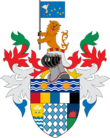Local government in Phinbella

|
This article or section is a work in progress. The information below may be incomplete, outdated, or subject to change. |
 |
|---|
|
|
|
|
Local government in Phinbella is the fourth and lowest level of government in Phinbella, it is administered with limited autonomy under the territorial government, and subsequently under the entity level government and the federal government. In the days of provisional government until now, local government is not mentioned in the federal constitution, yet local government is within the exclusive jurisdiction of the territorial government. Each territorial government in Phinbella recognizes local government according to its own constitution, while local governments in the directly administered territories and dependent territories are recognized by the Free area of the Federation government or the federal government itself, including local governments in the three autonomous territorial units. recognized by the Taemhwanian government. The federal Ministry for Regional Services, Cities, Urban and Local Government as well as housing and local government ministries at the entity level play a role in coordinating and standardizing local government practices throughout Phinbella. The level of local government in Phinbella can distinguish between districts and cities though in the geographical level of "collectivity" in the Free area of the Federation and "district" in Oriental Taemhwan.
Phinbellan local government, commonly referred to as local authority, is directly run by the council, its public administrative area is generally referred to as local authority area or LAA, covering urban and rural locality areas using different postcodes. Phinbellan local governments usually have the power to collect taxes in the form of assessments, to establish laws and regulations and to issue licenses and permits for any type of trade. It also provides basic facilities as well as planning and developing the areas it has planned, unless the power to collect waste and rubbish is handled by the local sanitary board which is also under the local authority.
Phinbella is a Phineaner-speaking country that uses the terms "shire" and "borough", where the term "shire" is used in rural areas and interior municipalities in directly administered territories, dependent territories and special administrative territories, while the term "borough" is used in rural areas in Oriental Taemhwan. Municipalities in special administrative territories directly use the term "municipality" for large municipalities and "shire" for small municipalities.
This local government is headed by a civil servant with the title of President or Yang Di-Pertua for rural, municipal and shire councils, and Mayor for city councils. Council board members are usually known as councilors and they are elected through local council elections over a four-year term, but the head of local government is not involved in everything related to politics, including local council elections.
State controlled
Types of local government
Local governments by type and territories
| Local government area types | PhFAF | OHT | NTL | SAT | DAT | PM | RD | TT | Total |
|---|---|---|---|---|---|---|---|---|---|
| Boroughs | |||||||||
| Cities | |||||||||
| District councils | |||||||||
| Municipalities | |||||||||
| Rural cities | |||||||||
| Shires | |||||||||
| Towns | |||||||||
| Aboriginal councils | |||||||||
| Aboriginal shires | |||||||||
| Sub-total | |||||||||
| Special or modified local councils | |||||||||
| Total |